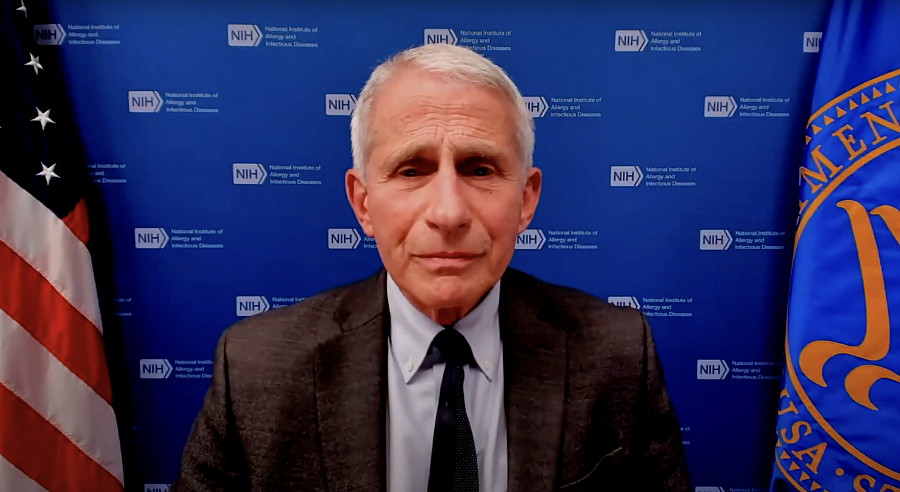Dr. Anthony Fauci talks to WaPo's Dan Diamond on the pandemic and where we go from here

Dr. Anthony Fauci speaks at a Center for Health Journalism webinar this week.
(Center for Health Journalism)
As winter approaches, the United States shouldn’t let its guard down on COVID-19, said Dr. Anthony Fauci, the country’s top infectious disease specialist.
“We should anticipate that we very well may get another variant that would emerge that would elude the immune response that we’ve gotten from infection and/or from vaccination,” he said in a Center for Health Journalism webinar this week. “I hope we don’t get that … but we should not be surprised if we do.”
As Fauci prepares to retire from his long-held post as the nation’s top infectious disease expert, he joined the Center for Health Journalism and national health reporter Dan Diamond of The Washington Post to share his thoughts on the pandemic, lessons learned, and his broader reflections on health disparities, data collection and stories journalists should follow.
On the future of the pandemic
The idea of living in a world without COVID isn’t realistic, Fauci said.
“I think it would be a bit cavalier to all of a sudden say, We’re completely through with it,” he said, pointing to other times when things seemed better and along came delta and then omicron.
President Joe Biden’s recent comments that the pandemic is “over” likely referred to the country entering a different stage, one in which we aren’t seeing the same high rates of hospitalizations and deaths, Fauci said. While Biden mentioned ongoing challenges, nuances often get lost in messaging, he said.
“It’s obvious that that could be problematic because people would interpret it as it’s completely over and we’re done for good, which is not the case — no doubt about that,” he said.
On lessons learned
The COVID-19 pandemic has underscored what happens when public health faces rapidly evolving science and data on everything from masking to the vaccination rate required for herd immunity. Information might be correct at the time, but changes when more data is gathered, Fauci said.
Using a baseball metaphor, Fauci added: “Does that count as a strike out or does that count as a different ball game?”
For example, if public health officials had known early on about COVID’s airborne and asymptomatic transmission, they may have made different recommendations early on, when there were just a handful of known cases in the United States, he said.
On long COVID
Up to 20% of people who contract COVID-19 can experience persistent symptoms known as long COVID. That’s something we need to understand better — and do something about, Fauci said.
“With regards to long COVID, it’s a real phenomenon and we really have to deal with it,” he said. “… (I)t’s a very serious problem and we did recognize that early on.”
On stories journalists should follow
Fauci advised journalists to pay more attention to the lack of acceptance of vaccination and updated vaccines among some Americans. The data are “crystal clear” when looking at the correlation between higher death rate and severe disease among the unvaccinated, as well as better outcomes for those who are boosted and double-boosted.
“… (A)nd yet, in this rich country of ours, we have 68% of the population is vaccinated and only one half of those have received one booster,” he said.
As a result, the country’s vaccination rates rank very poorly when compared with other developed and even some low- and middle-income countries. He urged journalists to explore further the political divisiveness now associated with public health.
“That should never be — that a public health determination is made and influenced by what your political ideology is,” Fauci said.
On being perceived as a ‘polarizing’ figure
Fauci said he’s tried to stay out of politics and stick with the science and data. But as Diamond pointed out, that’s made some perceive him as a polarizing national figure.
“When I say we should get vaccinated because it saves lives and someone says ‘No,’ am I the polarizing figure or is the person who is someone saying something that’s completely untrue creating the polarization?” he said. “Some people say hydroxychloroquine works, it’s the end all. I say there’s no data that shows that it works. Am I being politicized? Am I polarizing? I don’t think so. I’m just sticking with the data.”
On health disparities
Through his decades-long experience with public health, Fauci said it’s been painful to observe the country’s longstanding health disparities, which the pandemic so clearly brought to the forefront.
He stressed the need to address disparities that are a result of the social and environmental forces driving health, as well as those deeply rooted in racism. Such “social determinants of health” can lead to higher incidences of diabetes, hypertension, obesity, chronic liver disease, and chronic kidney disease.
“We need a decades-long commitment to overcome them,” he said.
On health care delivery
The country’s fragmented health care system and disjointed health records systems pose another big hurdle. These problems make it difficult to gather real-time, real-world data when there is an evolving outbreak.
During the pandemic, basic data on the pandemic often took months to appear in the U.S. That’s compared to countries with universal health coverage such as the United Kingdom or Israel that could provide real-time data to guide pandemic policy.
“That is one thing that really needs to be fixed: to modernize our ability to get real time data, not data that’s two and three months old,” Fauci said.
On the secret to getting things done
As Fauci prepares to retire in December, he offered his observations on what it takes to get things done in the federal government – and beyond.
“Persistence,” he said. “You’ve got to be able to have the persistence, and the energy and the resilience to accept disappointment but keep your eye on the ball of what you need to get done.”
**
Watch the full presentation here:
